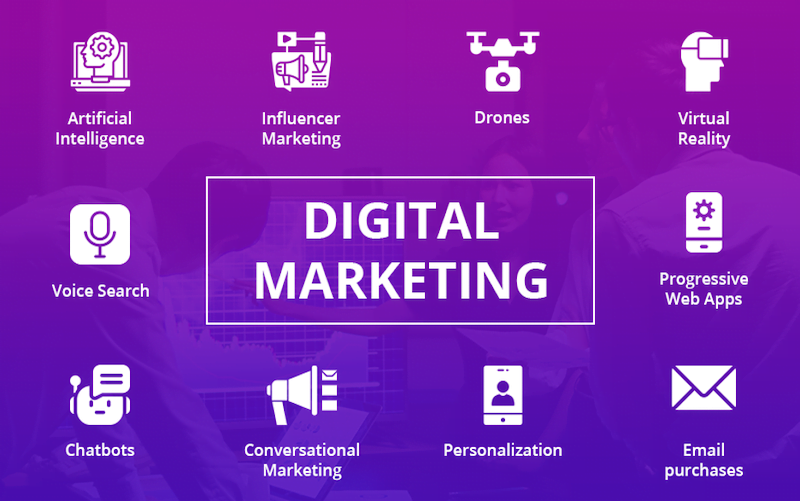Marketing is an ever-evolving field, with new trends and technologies constantly shaping how businesses engage with consumers. Staying updated on the latest marketing trends is essential for businesses looking to remain competitive and effectively reach their target audiences. In 2025, several emerging trends are poised to influence how marketers create and execute their campaigns, from artificial intelligence to experiential marketing.
In this article, we’ll explore the most significant marketing trends you should know about in 2025, so you can adapt your strategy to meet the changing demands of consumers and the digital landscape.
1. AI and Automation in Marketing
Artificial intelligence (AI) and marketing automation have been steadily growing in importance, and 2025 is expected to see an even greater reliance on these technologies. AI is helping businesses personalize their marketing efforts, automate tasks, and gain deep insights into customer behavior.
How AI and Automation Are Shaping Marketing:
- Personalization: AI enables businesses to deliver highly personalized content and offers based on individual preferences, browsing history, and purchasing patterns. This helps marketers improve customer engagement and conversion rates.
- Chatbots and Virtual Assistants: AI-powered chatbots are increasingly being used to provide instant customer support and streamline interactions with consumers on websites, social media platforms, and apps.
- Predictive Analytics: AI and machine learning algorithms analyze past customer data to predict future behavior, helping businesses tailor their campaigns for higher success rates.
- Content Automation: AI tools can automatically generate content, such as emails, social media posts, and blog articles, based on a company’s brand voice and audience preferences.
By integrating AI and automation into your marketing strategy, you can save time, optimize processes, and create more tailored experiences for your customers.
2. Voice Search Optimization
Voice search technology, fueled by virtual assistants like Siri, Alexa, and Google Assistant, has gained immense popularity in recent years. As more people use voice commands to search for information, businesses need to optimize their websites and content for voice search to remain visible in search engine results.
Why Voice Search Is Important:
- Natural Language Queries: Voice search tends to use conversational language, so it’s important for businesses to optimize content for long-tail keywords and phrases that mirror how people speak.
- Local Search: Many voice searches are location-based, making it crucial for businesses to focus on local SEO to attract nearby customers.
- Mobile Optimization: As voice search is primarily used on mobile devices, ensuring your website is mobile-friendly is key to appearing in voice search results.
Adapting your SEO strategy to optimize for voice search can help you reach a broader audience and improve your search engine rankings.
3. Interactive and Immersive Content
Consumers are increasingly looking for interactive and immersive content experiences that go beyond traditional text and images. Interactive content such as quizzes, polls, and games, as well as immersive experiences like augmented reality (AR) and virtual reality (VR), are becoming central to modern marketing strategies.
Why Interactive and Immersive Content Matters:
- Increased Engagement: Interactive content encourages users to actively participate, which can lead to higher engagement and time spent with your brand.
- Brand Differentiation: Using AR or VR technology in marketing campaigns allows brands to stand out by offering unique experiences that captivate consumers.
- Customer Insights: Interactive content can help gather valuable data on user preferences, behavior, and feedback, which can be used to tailor future campaigns.
Integrating interactive and immersive content into your marketing strategy can make your brand more memorable and strengthen the connection with your audience.
4. Influencer Marketing Evolution
Influencer marketing continues to be a powerful strategy, but it’s evolving as consumers become more discerning and demand greater authenticity. In 2025, micro-influencers and niche content creators are expected to gain even more traction as brands look for more genuine, personalized connections with their target audiences.
How Influencer Marketing Is Changing:
- Micro-Influencers: Brands are shifting their focus from celebrity endorsements to micro-influencers—individuals with smaller, but highly engaged, followings. These influencers are seen as more trustworthy and relatable to their audience.
- Authenticity Over Popularity: Consumers are increasingly seeking out influencers who share their values and produce genuine, unfiltered content. Transparency about partnerships is crucial to maintaining credibility.
- Long-Term Partnerships: Brands are moving away from one-off campaigns and are focusing on building long-term relationships with influencers who align with their brand’s mission and values.
By embracing the influencer marketing evolution, you can create more meaningful connections with your audience and improve brand credibility.
5. Social Commerce
Social commerce refers to the integration of e-commerce capabilities directly into social media platforms, allowing users to discover and purchase products without ever leaving the platform. This trend is gaining traction as social media platforms continue to add shopping features to enhance the user experience.
Why Social Commerce Is on the Rise:
- Seamless Shopping Experience: Social commerce allows consumers to shop without interrupting their social media experience, making it easier for them to make purchases in the moment.
- Shoppable Posts: Platforms like Instagram, Facebook, and TikTok are increasingly enabling businesses to tag products in posts and stories, allowing users to buy directly from the app.
- Influencer and User-Generated Content: Social commerce also leverages user-generated content and influencer marketing, making it easier for consumers to find products they trust and relate to.
Social commerce provides a unique opportunity to capitalize on social media’s power and integrate it with your e-commerce strategy.
6. Sustainability and Ethical Marketing
As consumers become more environmentally and socially conscious, sustainability has emerged as a key priority for businesses. Ethical marketing, which focuses on promoting sustainable practices, social responsibility, and transparency, is increasingly important for building brand loyalty and trust.
Why Sustainability Matters:
- Consumer Demand: Consumers, especially younger generations, are demanding that brands take a stand on social and environmental issues. They are more likely to support companies that demonstrate a commitment to sustainability.
- Brand Reputation: Brands that focus on ethical marketing and sustainability can enhance their reputation, attract loyal customers, and differentiate themselves in a competitive market.
- Long-Term Impact: Implementing sustainable practices not only helps the planet but can also lead to cost savings through energy efficiency, waste reduction, and resource optimization.
By incorporating sustainability and ethical practices into your marketing strategy, you can appeal to conscious consumers and build a positive brand image.
7. Video Marketing Continues to Dominate
Video marketing has been on the rise for several years, and it shows no signs of slowing down. In 2025, short-form video content (such as TikTok, Instagram Reels, and YouTube Shorts) is expected to be even more integral to marketing strategies, as it captures consumers’ attention quickly and effectively.
Why Video Marketing Is Essential:
- Increased Engagement: Video content is highly engaging, providing both visual and auditory stimulation that helps hold viewers’ attention longer.
- Shareability: Videos are more likely to be shared on social media, expanding your brand’s reach and visibility.
- Storytelling: Video allows for more compelling storytelling, making it easier to connect emotionally with your audience.
Leveraging video marketing can increase brand visibility, boost engagement, and help convey your message in a more impactful way.
8. Privacy and Data Protection Concerns
As data privacy concerns continue to grow, marketers must be mindful of the way they collect, store, and use customer data. With regulations like the GDPR in Europe and similar laws in other regions, businesses must prioritize transparency and security when handling customer data.
Why Data Privacy Is Important:
- Trust and Credibility: Customers are more likely to engage with brands that prioritize their privacy and handle their data responsibly.
- Legal Compliance: Adhering to data protection laws is crucial for avoiding legal issues and potential fines.
- Transparency: Clear communication about how customer data is used will help build trust and encourage loyalty.
By focusing on data privacy and security, you can maintain a positive relationship with your customers and ensure compliance with evolving regulations.
Conclusion
As the marketing landscape continues to change, staying ahead of emerging trends is essential for success. From leveraging AI and automation to embracing sustainability and social commerce, businesses that adapt to these trends are likely to see enhanced engagement, increased conversions, and stronger brand loyalty. By integrating these trends into your marketing strategy, you can stay competitive in a rapidly evolving market and meet the demands of today’s consumers.

